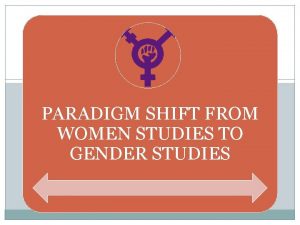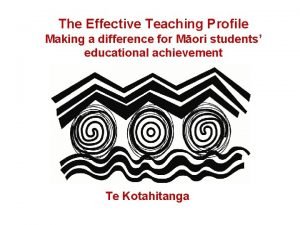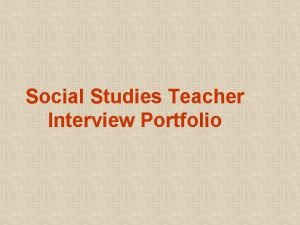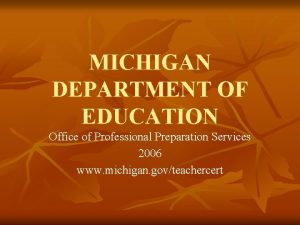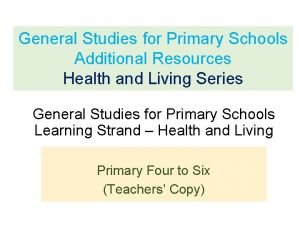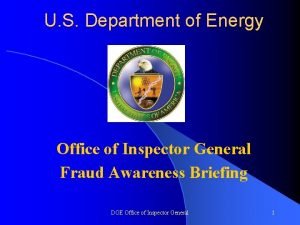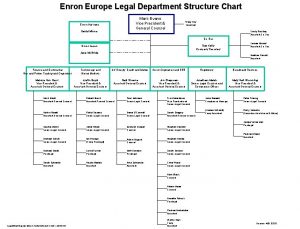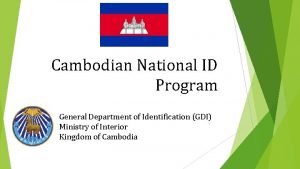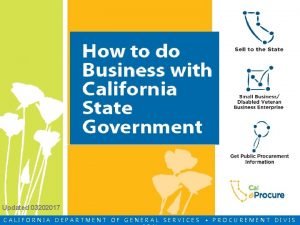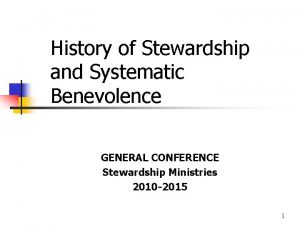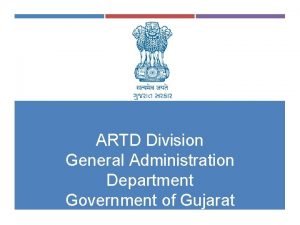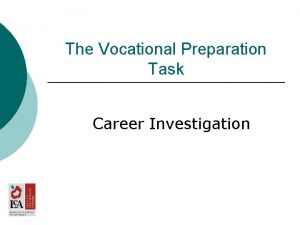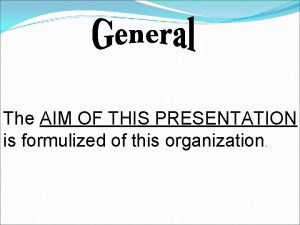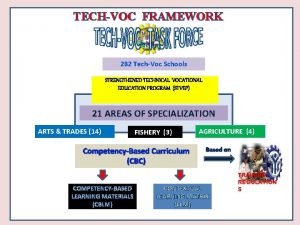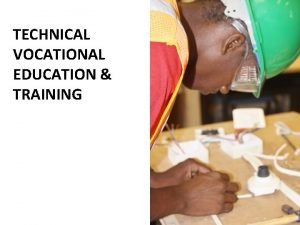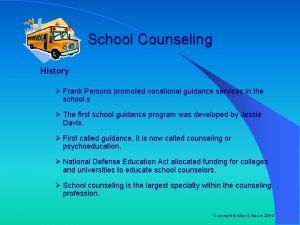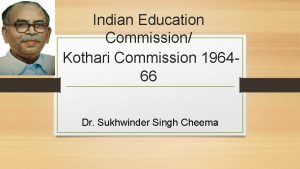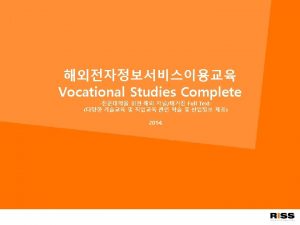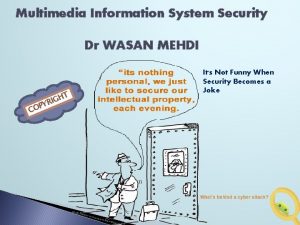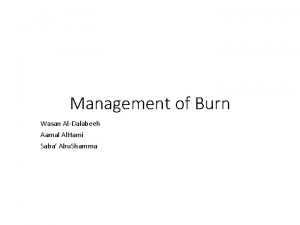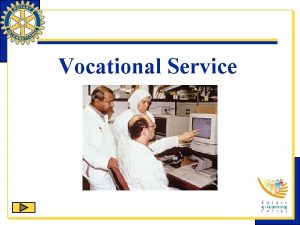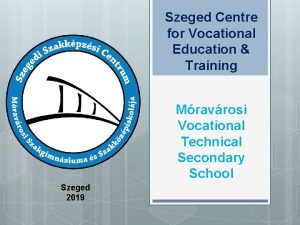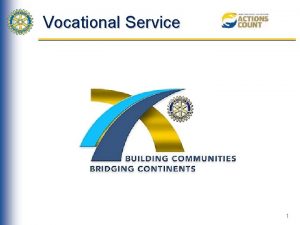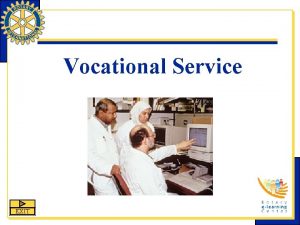AN EFFECTIVE TEACHER GENERAL STUDIES DEPARTMENT WASAN VOCATIONAL


























- Slides: 26

AN EFFECTIVE TEACHER GENERAL STUDIES DEPARTMENT WASAN VOCATIONAL SCHOOL 20 JULY 2011

REFLECTION 1. Did you want to become a teacher? 2. Is it your first choice? If it is, WHY did you choose to be one? 3. Do you ENJOY what you are doing? 4. Are you PROUD of being a teacher? 5. How long have you been teaching? 6. Do you think you are an effective/ successful teacher? WHY?

The Instruction/Teaching Paradigm From Teaching to Learning: A New Paradigm for Undergraduate Education , Robert Barr & John Tagg. Nov/Dec 1995. § Provide / deliver instruction § Transfer knowledge from faculty to students § Offer courses / programmes § Improve the quality of instruction § Achieve access for diverse students

The Learning Paradigm (Outcomes) Produce Learning Elicit student discovery and construction of knowledge Create conducive learning environments Improve the quality of learning Achieve success for diverse students.

Conceptions of Learning (Säljio, 1979) Five categories in the concept of “Learning”: (1) Learning as a quantitative increase in knowledge. (2) (3) (4) (5) Learning is acquiring information or “knowing a lot” Learning as memorising. Learning is storing information that can be reproduced. Learning as acquiring facts, skills and methods that can be retained and used as necessary. Learning as making sense or abstracting meaning. Learning involves relating parts of the subject matter to each other and to the real world. Learning as interpreting and understanding reality in a different way. Learning involves perceiving & comprehending

IMPORTANT Considerations § (1) Know your subject (What to teach) § § intellectually challenging (2) Know how to teach Teaching skills/methods - to be acquired, improved and extended (3) Know how your students learn consider what students know and how to improve their learning (4) Socially challenging context, cultures, traditions (5) Outcomes: students success and inculcation of appropriate values

What is an Effective Teacher? Davis, B. G (1993): Four Clusters of skills, strategies and attitude that promote students’ achievement: (1) Create an environment for learning ( maintain rapport, appropriate feedback, respect diverse talents and use collaborative strategies) § (2) Help students become autonomous, self regulated/motivated learners (communicate your expectations and goals, stimulate students’ intellectual interests)

• (3) Organize, plan and explain materials in ways appropriate to students’ abilities (subject matter, examples and analogies, using students’ experiences and background knowledge) • (4) Reflect on and Evaluate the teaching-learning process (examine what you are doing, effects on students, observe them and help them to improve!)

FOUR(4) clusters of instructional skills and strategies and attitudes that promote students academic achievement) (I) Creates an environment for learning (II) Helps students become autonomous, self regulated/motivated learners (III) Organizes and explores materials in ways appropriate to students abilities (IV) Reflects on and Evaluate teaching

CHORE

Purpose of Teaching (1) Coverage -conveying of information (2) Understanding - generating understanding (3) Motivation - stimulating interest

SKILLS OF TEACHING EXPLAINING CLARITY INTEREST/ PERSUASION Using audio-visual aids Varying student activities Comparing and contrasting Openings and endings PRESENTING INFORMATION GENERATING INTEREST LECTURE PREPARATION

How to structure a LESSON? (i) What is the central question/topic of the lesson (ii) What do you expect the students to understand or learn from the lesson (objectives) (iii) What teaching methods will you use? (iv) Will the opening/introduction be clear and interesting? (v) Are the sections clearly organised and linked? (vi) Are the main points clear and accurate? (vii) Are examples and illustrations suitable? (viii) Are summaries clear and coherent? (ix) What activities are to be carried out? (x) What alternative plans/remedial lessons to solve weaknesses or problems faced (if it happens!) (xi) Are AVA & resources suitable and available? (xii) Will the students you are going to teach understand your lesson (xiii) How do you plan to find out?

Opening of a Lesson -crucial because the first impression of lecturers accounted for two-thirds of subsequent impressions of the same lecturers (1) Gain and hold attention (2) Establish a relationship/rapport with your students (3) Indicate the content and structure

Skills in Generating Interest (1) Show your own interest/commitment to the topic (2) Think of and use examples, analogies, and models which are apt for the audience and the topic (3) If the material is unfamiliar begin with several examples (4) Use a mixture of modes of explaining but particularly the narrative mode (5) Play on the intellectual curiosity of the audience through the use of puzzles, problems and questions…

SKILLS IN PRESENTING INFORMATION Classical structure-broad sections and divided into subsections Problem-centred structure-suitable for controversial issues like ‘ science vs religion? Seeing is believing or believing is seeing? ‘ Nature vs Nurture’ Sequential structure – easy to difficult (normally) or vise versa depending on your topic/subject.

Skills of Explaining Interpretative - What does it mean? - What are local anaesthetics? Descriptive - eg “ How does it work? ” Reason-Giving - eg “why is…. . ? ”

Skills of Clarity in Explaining: (1) Signpost: -statements which signal the direction and structure of a lecture - eg: “Today I want to examine 4 approaches to the management of tumours. First, …” § (2) Frames –statements which delineate the beginning and ending of topics and subtopics -eg. “let’s turn now to the 2 nd aspect of today’s lecture that is the uses of chemoteraphy in…. ” § (3) Foci: -statements which highlight and emphasize key points eg “Therefore, the basic principle underlying chemoterapy is in this picture …” § (4) Links - statements that link the sections of the lecture together. eg “ I have examined 4 approaches to the management of tumours, now let me …. . ”

Skills in Persuasive Explaining Know your audience and estimate what kinds of arguments may be appealing and interesting Show to the audience that you are credible, trustworthy and have the expertise. Present both sides of arguments Say what experts or expert groups do when faced with the problem you are discussing Give conclusion if the problem is too complex for the students Describe your views when dealing with controversial issues If the task is complex prepare them for the likelihood of failure. Never say the task is easy. Rather, say it may not be easy at first. If the task is threatening, admit it and describe how they might feel and what they can do to reduce their anxiety.

ENDING THE LESSON often neglected!- very important because summarising and linking helps understanding, recall and reinforcement Summary should emphasize: ü(i) key points ü(ii) show the links within the topic, between the topic and other topics and previous knowledge / experience ü (iii) the summary may be provided and prepared in the form of handout or slides or transparency ü(iv) coffee breaks and time to get to the next lecture appreciated by students as well as teachers.

How to evaluate your Lesson? Student learning -exam results/tests Student reactions -rating schedules Peer evaluations -pairs of lecturers or groups of lecturers can undertake evaluation of each other’s lectures. Self-evaluation -recall and reflections

Some common criticisms of Lessons (Brown, G & Atkins, M; 1988, Effective Teaching In Higher Education, Methuen & Co. Ltd, London pp 13) Students’ Views Teachers’ Views Inaudability Incoherence Failure to pitch at an appropriate level Not emphasizing key points Inappropriate time/timing q Saying too much too quickly q Assuming too much knowledge q Forgetting to provide summaries q Not indicating when making an aside (rather than a main point) q Difficulty in timing the length of a lecture

Some thoughts for sharing……. . There are two kinds of fools: Those who say: “This is new and therefore, it must be better”. and others who say: “This is old and therefore, it must be good”. (Williams, R. C & Cannings, T. C. The Dilemma of American Educational Reform, 2001.

A CHALLENGE TO CHANGE! CABARAN MENANGANI PERUBAHAN! Perkaitan Sikap(Attitude) dan Keupayaan (Ability) HIGH (Attitude) LOW (1) * WILL DO * CAN’T DO (4) * WILL DO * CAN DO (2) * WON’T DO * CAN’T DO (3) * WON’T DO * CAN DO CAN’T (Ability) CAN Tinggi

THERE ARE FOUR KINDS OF PEOPLE IN THE WORLD 1. People who watch things happen! 2. People to whom things happen! 3. People who make things happen! 4. People who do not know what is happening!

 Ict college of vocational studies
Ict college of vocational studies Ict college of vocational studies
Ict college of vocational studies Idaho division of vocational rehabilitation
Idaho division of vocational rehabilitation Paradigm shift from women studies to gender studies
Paradigm shift from women studies to gender studies Effective teaching profile
Effective teaching profile Social studies teacher interview questions
Social studies teacher interview questions Michigan department of education teacher certification
Michigan department of education teacher certification Erf deped
Erf deped Good afternoon teacher.
Good afternoon teacher. General studies primary 3
General studies primary 3 Jane jacobs columbia university school of general studies
Jane jacobs columbia university school of general studies Doe oig
Doe oig Legal department structure chart
Legal department structure chart Department of identification
Department of identification General department of criminal evidence
General department of criminal evidence California department of general services
California department of general services General conference stewardship department
General conference stewardship department Artd gujarat
Artd gujarat Lca career investigation task
Lca career investigation task Society vocational institute mughalpura
Society vocational institute mughalpura Stvep
Stvep Technical training definition
Technical training definition Frank parsons vocational guidance
Frank parsons vocational guidance What is vocationalism in sociology
What is vocationalism in sociology Types of vocational courses
Types of vocational courses Vocational school marketing
Vocational school marketing What are the aims of kothari commission
What are the aims of kothari commission



